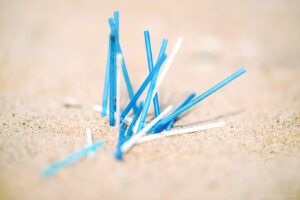 Countless millions of cotton buds are now polluting our seas. In this guest blog, Fidra’s Clare Cavers explains the background to the Cotton Bud Project and what is being done to tackle this plastic problem at source…
Countless millions of cotton buds are now polluting our seas. In this guest blog, Fidra’s Clare Cavers explains the background to the Cotton Bud Project and what is being done to tackle this plastic problem at source…
Visit the beach and you may well find yourself scanning the tideline for that perfect pebble or shell, only to find a litter of man-made objects amongst the natural debris. In the tangles of seaweed are lots of little plastic sticks, often mistaken for lollipop sticks or straws, but actually the remains of some of the hundreds of thousands of cotton buds flushed down toilets every week in the UK.
Because of their size and shape, plastic cotton bud sticks slip through wastewater treatment systems, wash into rivers and seas, and end up on our beaches. On one Scottish beach, 13,500 plastic cotton buds sticks were found by Marine Conservation Society Beachwatch volunteers in a single visit. Not only do they look bad, they are also an indicator of a public health risk as cotton buds mark the trail of sewage from bathroom to beach.
These plastic sticks are a danger to marine life as well and have been found in the stomachs of fulmars and loggerhead turtles and are even known to cause deaths due to damage to internal organs. In addition, plastics in the ocean act like a sponge for chemical pollutants such as pesticides. Toxins which may be present at low amounts in the water can build up to high levels on plastics as they are soaked up from the surrounding sea.
Fidra, an environmental charity based in Scotland, is liaising with manufacturers and retailers of plastic cotton buds, encouraging them to consider switching from plastic to a fully biodegradable alternative such as paper. Earlier this year the charity was delighted by the resultant decisions of leading manufacturer Johnson & Johnson and retailer Waitrose, to phase out the plastic in their own brand cotton buds and move to paper by the end of 2016.
As these companies are leading the way on cutting back on this plastic problem, Fidra is recognising their example, aiming to add them to their Good Buddy List of Friendly Cotton Bud brands once the change is made.
Plastic in our seas is a major pollution problem. Better materials are out there and the more we use them the closer we are to a cleaner ocean. This is an excellent example of major brands taking a lead and Fidra hopes that many more companies will follow soon.
Even paper cotton buds should be disposed of responsibly with household waste. However, if they do end up in the sewage system they stand a much greater chance of becoming waterlogged and settling out of the wastewater stream, never making it onto our beaches. The public can take The Cotton Bud Project pledge to show their support for using fully-biodegradable cotton buds.
Dr Clare Cavers is the Research Officer for Fidra, a Scottish registered charity and SCIO no.SCO43895, based in East Lothian, Scotland.
